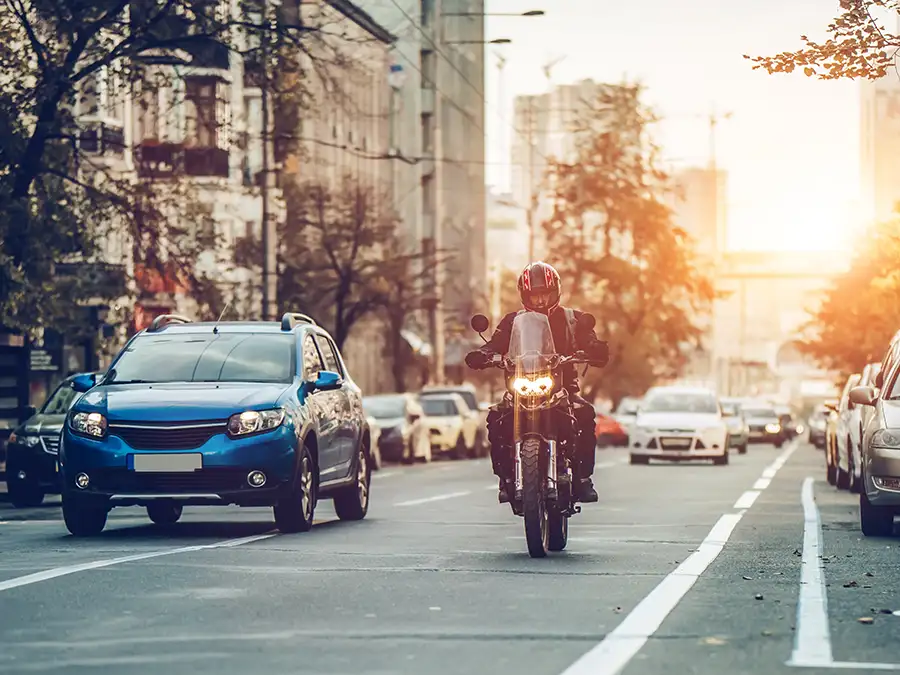
Protect your safety and legal rights by understanding motorcycle helmet laws in Florida.
Miami’s balmy climate makes motorcycling a popular mode of transport and leisure in the city, offering a sense of freedom for riders that’s hard to match. But with this freedom comes a degree of risk.
The bustling urban traffic, combined with a lively tourist scene, increases the likelihood of accidents and injuries for motorcyclists. Understanding state and local helmet laws becomes essential for ensuring your safety and protecting your legal rights in the event of an accident on Florida roads.
This article will guide you through the complexities of Miami’s helmet regulations, offering crucial information to help you stay protected and on the right side of the law.
How common are motorcycle accidents in Florida?
With over 1.2 million licensed motorcycle riders and roughly 620,000 motorcycles registered in the state as of 2021, these two-wheeled vehicles make up approximately 3% of all registered vehicles and account for less than 1% of the traffic on Florida roads.
Yet, despite their smaller presence, motorcycles are disproportionately represented in Florida traffic-related casualties, constituting 18% of the state’s traffic deaths and 12% of severe injuries during the previous 5 years, according to the Florida Department of Transportation.
Nationally, the National Highway Traffic Safety Administration (NHTSA) reported that 5,932 motorcyclists died in traffic accidents in 2021, accounting for 14% of all traffic fatalities—the highest number since data started being collected in 1975.
This is in addition to the approximately 82,686 motorcyclists who sustained nonfatal injuries, a 5% increase from 2020.
Debunking the top 10 motorcycle accident myths: The real facts
Uncover the truth behind common motorcycle accident myths. This article dispels misconceptions, providing insights into real causes and prevention strategies.
What causes most motorcycle accidents in Florida?
The causes of motorcycle accidents in Florida are multifaceted and often involve a combination of factors that can be unique to the state’s environment and road conditions. Some of the most common causes include:
- Impaired driving. Driving under the influence of alcohol or drugs is a significant cause of accidents, affecting judgment and reaction times. In fact, in 2021, approximately 43% of motorcycle riders killed in single-vehicle crashes were alcohol-impaired.
- Distracted driving. The prevalence of distracted driving due to smartphone use or other distractions can lead to drivers failing to notice motorcyclists on the road.
- Road hazards. Potholes, uneven road surfaces, slick conditions from rain, and debris can be more hazardous to motorcycles than larger vehicles.
- Speeding. Both motorcyclists and other drivers speeding can lead to accidents due to reduced reaction times and the increased severity of an impact.
- Lane splitting. While lane splitting is not legal in Florida, some motorcyclists still engage in it, leading to accidents due to the close proximity to other vehicles and limited space for maneuvering.
- Visibility issues. Motorcycles have a smaller profile compared to cars or trucks, making them less visible to other drivers, especially at intersections or in heavy traffic.
- Left-turn accidents. These are common when a vehicle turns left at an intersection without noticing an oncoming motorcycle, often due to the bike’s smaller size and the car driver’s failure to observe their surroundings properly.
Understanding and mitigating these risks through safe riding practices, proper gear and awareness can help reduce the frequency and severity of motorcycle accidents in Florida.
Safety tips for motorcyclists to navigate the busy streets of Miami and South Florida.
Are there more motorcycle deaths in states without helmet laws?
Yes, according to the NHTSA, in states without universal helmet laws in 2021, approximately 55% of motorcyclists who died weren’t wearing helmets, compared to only 9% in states with helmet laws in place. This discrepancy underscores the potential life-saving impact of helmet use.
Overall, the NHTSA estimates that motorcycle riders without helmets have a 40% higher chance of suffering fatal head injuries and a 15% higher chance of suffering nonfatal injuries during a crash than riders with helmets.
Can I ride a motorcycle in Florida without a helmet?
According to Florida law, motorcycle riders are generally required to wear federally approved helmets, with some exceptions.
Individuals over 21 years old can ride a motorcycle without a helmet if they have an insurance policy with at least $10,000 in medical benefits for motorcycle crash injuries.
The helmet regulations also don’t apply to riders inside an enclosed cab or to individuals aged 16 and older who are operating or riding motorcycles with engines smaller than 50 cubic centimeters, with a power rating of no more than 2 brake horsepower, and incapable of exceeding 30 miles per hour on flat terrain.
However, riders under 16 must wear a helmet regardless of the motorcycle’s power or their insurance coverage.
When did Florida get rid of the helmet law?
Florida modified its helmet law in 2000. Before this change, all motorcycle riders in the state were required to wear helmets. The revised statute, which took effect on July 1, 2000, allows riders over the age of 21 to go without a helmet if they have medical insurance coverage of at least $10,000 to cover injuries that may occur as a result of a motorcycle crash.
This change effectively made helmet use optional for riders meeting those conditions, while still mandating helmets for riders under the age of 21.
Two wheels vs. four: The unique challenges of motorcycle accidents in Miami
Why do motorcycle accidents differ so much from car accidents?
What is the fine for not wearing a helmet in Florida?
In Florida, the failure to wear a helmet when it is required by law, such as for riders under the age of 21 or those without the necessary insurance coverage, is considered a noncriminal traffic infraction and is punishable as a nonmoving violation. The specific fine for this infraction can vary by county and other circumstances, but it’s typically $30 for a first offense.
Can I be pulled over for not wearing a helmet in Florida?
Yes, in Florida, if a law enforcement officer observes you riding a motorcycle without a helmet and you appear to be under the required age of 21, or if there’s another indication that you may be in violation of the state’s helmet laws, you can be pulled over.
For riders over 21, proof of the required medical insurance coverage would be necessary to avoid penalties for not wearing a helmet. If you do not meet the exemption criteria, not wearing a helmet can be a reason for a traffic stop and could result in a noncriminal traffic infraction.
Could not wearing a helmet impact my compensation after a motorcycle accident in Florida?
The short answer is yes. In Florida, if you’re injured in a motorcycle accident caused by someone else’s negligence, not wearing a helmet can potentially impact your compensation claim. This is due to the concept of comparative negligence, which is used in Florida.
Comparative negligence means that if you are found to be partially at fault for your injuries, your compensation may be reduced by your percentage of fault. So, if it’s determined that not wearing a helmet contributed to the severity of your injuries, the compensation you might otherwise be entitled to could be reduced.
The argument from the defense might be that some of the injuries could have been prevented or lessened if you had been wearing a helmet. However, it doesn’t necessarily bar you from receiving compensation altogether, especially if the other party is found to be primarily at fault for the accident itself.
If you find yourself in this situation, it’s important to consult with a motorcycle accident attorney who can provide legal advice specific to the details of your case and help protect your rights.
A guide to Florida motorcycle insurance requirements
Learn about Florida motorcycle insurance requirements and the potential penalties for riding without coverage or proof of financial responsibility in Miami.
Get help from a skilled Miami motorcycle accident attorney
If you’re a motorcycle rider who has been injured on Miami’s roads, it’s critical to understand the complexities and biases you could face in the legal system. Motorcycle accidents often result in severe injuries that can have life-changing consequences, and the path to fair compensation is fraught with challenges. Insurance companies and jurors may hold biases, viewing motorcyclists as risk-takers, which can unjustly affect the outcome of your case.
This is where the expertise of a seasoned personal injury attorney becomes invaluable.
Miami accident attorney Mike Redondo has a deep understanding of Florida’s motorcycle laws and is committed to fighting for the rights of riders. With his experience, he knows how to navigate the biases and hurdles you may encounter and will work tirelessly to ensure you receive the compensation you deserve for your injuries and losses.
Don’t let the negligence of others derail your life without a fight. Reach out to Redondo Law by filling out the form below to schedule your free consultation.
References
Desantis, R., Governor, F., Thibault, K., & Fdot, P. (n.d.). Florida Department of Transportation FY 2021 Highway Safety Plan. https://www.nhtsa.gov/sites/nhtsa.gov/files/documents/fl_fy21_hsp_0.pdf
Motorcycles: 2021 Data 1. (n.d.). Retrieved November 9, 2023, from https://crashstats.nhtsa.dot.gov/Api/Public/ViewPublication/813466#:~:text=In%202021%20there%20were%205%2C932
Statutes & Constitution :View Statutes : Online Sunshine. (n.d.). Www.leg.state.fl.us. http://www.leg.state.fl.us/statutes/index.cfm?App_mode=Display_Statute&URL=0300-0399/0316/Sections/0316.211.html
Traffic Safety Facts Laws. (2008). https://www.nhtsa.gov/sites/nhtsa.gov/files/810887.pdf





